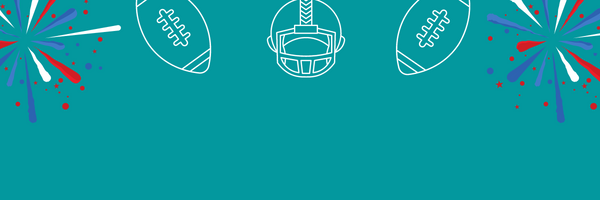As the Super Bowl® LVII approaches, have you noticed how the term “Super Bowl” is not often mentioned in commercials and other forms of advertising? Instead, they use words like “The Big Game” or something similar. That’s because the National Football League (NFL) has owned the “Super Bowl” trademark since 1969, and they are ferocious defenders of their Intellectual Property. Companies that want to use the name will need to pay them for the rights.
A trademark is a “word, name, symbol, device, or any combination, used or intended to be used to identify and distinguish the goods/services of one seller or provider from those of others, and to indicate the source of the goods/services.” You can learn more about trademarks in our blog here. The NFL is notorious for actively enforcing its rights in all its marks. Considering that the Super Bowl is the most-watched TV show in the United States and, therefore, the most profitable venture for the NFL, they place stringent rules for broadcasting, advertising, commercial use, and sometimes even for non-profits. Unless you have concrete permission from the NFL, you should be careful how you use the term.
TRADEMARKED TERMS YOU CAN’T USE
The SUPER BOWL® trademark is not the only one you can’t use without a license; if you were planning on advertising an event or deal, like a contest or giveaway, that involves the Super Bowl, you want to avoid also using the following terms: “Pro Bowl,” “Super Sunday”, The Super Bowl logo, “NFL”, “AFC” or “NFC,” “The National Football League”, “American Football Conference”, “National Football Conference” and any team names or player names.
WHAT CAN YOU SAY?
If you want to capitalize on the opportunity this event presents for you or your business, this is what you are allowed to do, according to the NFL:
- You can say The Big Game or Big Game
- Stick to general football terms
- For design, stick to generic football shapes and themes
- If you are mentioning a player, you may use his number
- To be safe, you can add a disclosure like, “Not an official Sponsor of the NFL.”
NOMINATIVE FAIR USE
You may use the trademarked terms under a particular condition called nominative fair use: this exception allows for marks to be used for purposes of reporting, commentary, criticism, parody, and comparative advertising. The use of the terms must be strictly informative or the most accurate way to describe something. For example, news outlets reporting on the Super Bowl can call it what it is and the names of the teams involved. Fair use allows us to mention the Super Bowl in this blog.
SUPER BOWL VIEWING PARTIES
Based on this exception, if you are hosting a private watch party in your home for friends not being charged admission, you may use the marks on invitations without infringing.
“On the other hand, if you are a restaurant, bar, or business owner that stands to make money off of the event, regardless of whether you charge admission, this likely does not fall within the fair use exception, and you may be subject to a penalty for trademark infringement,” said Intellectual Property Attorney Marcos Garciaacosta.
“For hosting commercial events, you want to have a proper commercial license to show the game. Depending on how many persons your establishment serves, you should expect to pay hundreds or thousands of dollars for the broadcast license. That license does not allow you to advertise the game using the trademarked names we mentioned. You must have separate permission from the NFL to use the terms for promotional purposes”, said Attorney Marcos.
If you’re hosting an event or have specific questions about using trademarked or copyrighted material, or if you are being accused of piracy or infringement, you must get immediately in touch with Attorney Marcos Garciaacosta at (480) 324-6378 for a free consultation on how to avoid trademark infringement and score a touchdown for your team!
MORE ABOUT ATTORNEY MARCOS
Attorney Marcos E. Garciaacosta is a business, trademark, branding, patent, and intellectual property attorney. He practices with the United States Patent and Trademark Office (USPTO) and Federal Court.
